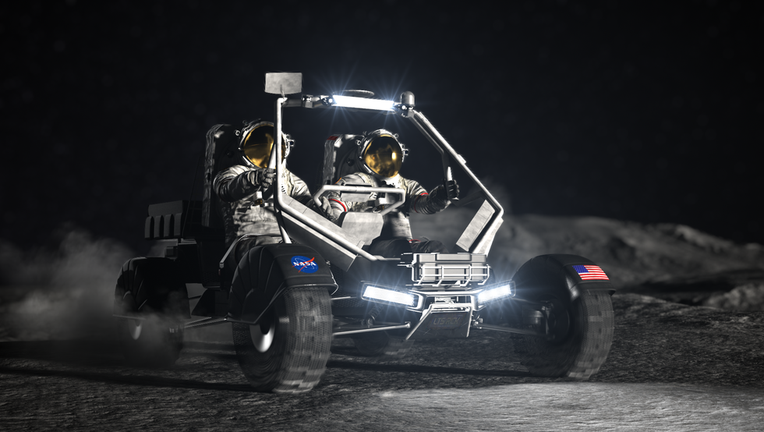NASA accepting proposals to build next lunar rover to explore moon

Artist's concept of NASA's next-generation Lunar Terrain Vehicle on the surface of the Moon. Credits: NASA
NASA is currently accepting proposals to build the next-generation Lunar Terrain Vehicle (LTV) that will allow astronauts to further explore the south polar region on the moon during the Artemis missions.
The plan calls for astronauts to study and sample more of the lunar surface using the LTV. The agency wants to contract the vehicle rather than owning it outright.
"We want to leverage industry’s knowledge and innovation, combined with NASA’s history of successfully operating rovers, to make the best possible surface rover for our astronaut crews and scientific researchers," Lara Kearney, manager of NASA’s Extravehicular Activity and Human Surface Mobility program, said in a news release.
RELATED: China launches new crew for space station with goal to put astronauts on moon before 2030
NASA said the LTV will function like a cross between an Apollo-style lunar rover and a Mars-style uncrewed rover. The idea is that the rover will be able to operate LTV remotely to transport cargo and scientific payloads between landing sites. They also want the rover to operate on its own without astronauts at times.

NASA unveils Artemis 2 moon mission crew
NASA named the four astronauts who will fly to the moon by the end of next year, including one woman and three men. The three Americans and one Canadian were introduced during a ceremony in Houston, home to the nation?s astronauts as well as Mission Control.
The rover must carry two suited astronauts, accommodate a robotic arm or mechanism to support science exploration, and survive the extreme temperatures at the lunar South Pole.
NASA hopes to use the new rover with astronauts starting with Artemis V in 2029. Before that, NASA wants the rover unmanned to conduct commercial activities once it lands on the lunar surface.
RELATED: Solar telescope provides spectacular sun photos in unprecedented detail
Proposals are due July 10, 2023. The contract is set to be awarded in November 2023.
As part of the Artemis missions, NASA named the four astronauts who will fly around the moon late next year, including the first woman and the first African American assigned to a lunar mission.

Artemis 1 mission: Orion spacecraft captures breathtaking images of the Earth and moon
As Orion began its closest approach to the moon yet, NASA shared live views of the moon and Earth as seen from the Artemis I spacecraft. (Credit: NASA via FOX Weather)
The four astronauts will be the first to fly NASA’s Orion capsule, launching atop a Space Launch System rocket from Kennedy Space Center no earlier than late 2024. They will not land or even go into lunar orbit, but rather fly around the moon and head straight back to Earth, a prelude to a lunar landing by two others a year later.
The mission’s commander, Reid Wiseman, will be joined by Victor Glover, an African American naval aviator; Christina Koch, who holds the world record for the longest spaceflight by a woman; and Canada’s Jeremy Hansen, a former fighter pilot and the crew’s lone space rookie. Wiseman, Glover and Koch have all lived on the International Space Station. All four are in their 40s.
The Associated Press contributed to this report. This story was reported from Los Angeles.

